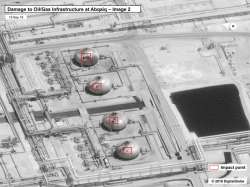US-Iran throwing verbal punches after Saudi Aramco drone attacks
Post-Saudi Aramco drone attack, Iran and USA having been throwing verbal punches at each other. Multiple top US officials have blamed Iran for backing those responsible for the attacks, while on the other hand Iran has distanced themselves from the Houthi rebels and warned USA that their military assets are in the region are in the reach of Iranian missiles.

Post-Saudi Aramco drone attack, Iran and USA having been throwing verbal punches at each other. Multiple top US officials have blamed Iran for backing those responsible for the attacks, while on the other hand Iran has distanced themselves from the Houthi rebels and warned USA that their military assets are in the region are in the reach of Iranian missiles.
US "locked and loaded" to respond to attack on Saudi oil: Donald Trump
US President Donald Trump warned that his administration was "locked and loaded" to respond to a recent drone attack against two Saudi oil facilities and said he was just waiting for input from Riyadh on how to proceed.
Donald Trump was reacting to Saturday's bombing by 10 unmanned aircraft of two refineries belonging to the Saudi state-owned oil company Aramco - the world's largest oil producer and a key cog in the global crude supply - that caused the energy giant to reduce its output by about 50 per cent.
"Saudi Arabia oil supply was attacked. There is reason to believe that we know the culprit, are locked and loaded depending on verification, but are waiting to hear from the Kingdom as to who they believe was the cause of this attack, and under what terms we would proceed! " Trump wrote on his Twitter account on Sunday, Efe news reported.
The president failed to specify who the US intelligence agencies believe was behind the attacks.
Yemen's Houthi rebels, which are backed by Iran, have claimed responsibility for the attacks.
The Shia militia has been engaged in a protracted civil war against the internationally-recognized Yemeni government, which has the military support of a Saudi-led coalition.
On Saturday, US Secretary of State Mike Pompeo directly blamed Iran and said there was no evidence to suggest that the attacks were actually carried out from Yemen.
Authorities in Saudi Arabia were still investigating the attack and have yet to identify a culprit.
The Iranian government, meanwhile, on Sunday denied any involvement.
The attack came amid speculation that Trump could meet with the Iranian president, Hassan Rouhani, on the sidelines of the upcoming United Nations' General Assembly set to be held in New York City at the end of the month.
In a subsequent tweet, Trump again railed against media reports of this possible diplomatic thaw.
"The Fake News is saying that I am willing to meet with Iran, 'No Conditions,'" he said. "That is an incorrect statement (as usual!)."
Trump also tried to use his favourite social media platform - where he has 63 million followers - to calm the markets down.
"PLENTY OF OIL!" he said in a succinct three-word tweet.
On Sunday, the barrel of Brent crude was trading at $70.98 in the New York futures market, an increase of 18 per cent compared to Friday's closing, when it stood at $60.15 per barrel.
In a previous tweet, Trump said he had authorized the release of the US' strategic oil reserves to guarantee the global fuel supply, which has been severely impacted by the attack on the two Saudi refineries.
"Based on the attack on Saudi Arabia, which may have an impact on oil prices, I have authorized the release of oil from the Strategic Petroleum Reserve, if needed, in a to-be-determined amount sufficient to keep the markets well-supplied," the president said.
"I have also informed all appropriate agencies to expedite approvals of the oil pipelines currently in the permitting process in Texas and various other States," Trump added.
The US has an estimated 630 million barrels of oil hidden underground along the coast of the Gulf of Mexico to be used in the event of a serious disruption to the world's oil supply chain.
This reserve aims to prevent a hypothetical scenario in which a temporary scarcity of oil results in a dramatic rise in prices that could again tank the US economy like it did during the 1973-74 oil crisis, when the oil embargo proclaimed by the Organisation of Arab Petroleum Exporting Countries caused a huge global economic shock and an increase of 400 per cent in the price of crude.
US military bases in region in reach of Iranian missiles: Iran Revolutionary Guards
A top commander of Iran's Islamic Revolution Guards Corps (IRGC) said that the US military bases in the region are within reach of Iranian missiles, Press TV reported.
"In addition to the US bases in the region, we have all their vessels, including aircraft carriers and warships, under fire of our missiles to a radius of 2,000 km, and are constantly monitoring them," Amir Ali Hajizadeh, commander of the IRGC's Aerospace Division, said on Sunday, Xinhua news agency reported.
"They (Americans) thought that they could get out of our range of (missile) fire if they stand 400 km away (from Iran's territorial waters). However, no matter where they are, if a conflict is ignited, their warships will be the first to be targeted by our fire," Hajizadeh was quoted as saying.
He said that Iran is "always ready for a great war" with the United States.
Hajizadeh also referred to shooting down of an "intruding" American spy drone by Iran's air defence forces over the country's southern waters in June, saying it was done in defence of the country's airspace.